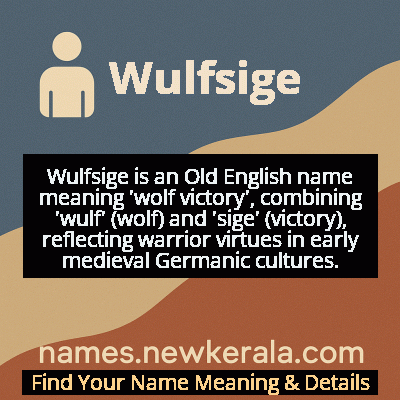Wulfsige Name Meaning & Details
Origin, Popularity, Numerology Analysis & Name Meaning of Wulfsige
Discover the origin, meaning, and cultural significance of the name WULFSIGE. Delve into its historical roots and explore the lasting impact it has had on communities and traditions.
Name
Wulfsige
Gender
Male
Origin
Christian
Lucky Number
3
Meaning of the Name - Wulfsige
Wulfsige is an Old English name meaning 'wolf victory', combining 'wulf' (wolf) and 'sige' (victory), reflecting warrior virtues in early medieval Germanic cultures.
Wulfsige - Complete Numerology Analysis
Your Numerology Number
Based on Pythagorean Numerology System
Ruling Planet
Jupiter
Positive Nature
Optimistic, inspirational, and creative.
Negative Traits
Scattered, exaggerating.
Lucky Colours
Yellow, gold, purple.
Lucky Days
Thursday.
Lucky Stones
Yellow sapphire.
Harmony Numbers
1, 2, 9.
Best Suited Professions
Arts, writing, communication.
What People Like About You
Creativity, optimism.
Famous People Named Wulfsige
Wulfsige of Sherborne
Bishop
Anglo-Saxon Bishop of Sherborne who played a significant role in the religious and political landscape of Wessex during the Viking Age
Wulfsige the Black
Nobleman
Powerful Anglo-Saxon thegn and landowner mentioned in the Domesday Book, known for his extensive holdings in Dorset
Wulfsige III
Abbot
Last Anglo-Saxon Abbot of Westminster before the Norman Conquest, known for his monastic reforms
Name Variations & International Equivalents
Click on blue names to explore their detailed meanings. Gray names with will be available soon.
Cultural & Historical Significance
The name's historical significance is particularly notable during the Viking Age and immediately preceding the Norman Conquest. Wulfsige appears in important historical documents like the Anglo-Saxon Chronicle and Domesday Book, indicating its association with the ruling classes. The combination of animal symbolism (wolf) with abstract victory concepts reflects the sophisticated naming conventions of late Anglo-Saxon England, where names carried deep meaning and social significance. As England transitioned from multiple kingdoms to a unified nation, names like Wulfsige represented the blending of local traditions with broader Christian European influences.
Extended Personality Analysis
Individuals named Wulfsige are typically perceived as possessing a unique blend of strength and strategic intelligence. The 'wolf' component suggests loyalty to their pack (family/community), protective instincts, and keen perception, while the 'victorious' element implies determination, resilience, and leadership qualities. They often demonstrate natural authority combined with careful deliberation, making them effective in positions requiring both courage and wisdom. Modern psychological interpretation would characterize Wulfsige as someone who balances primal instincts with refined judgment, capable of fierce protection when needed but equally skilled in diplomatic resolution.
In interpersonal relationships, Wulfsige personalities tend to be fiercely loyal to their inner circle while maintaining a certain strategic distance from outsiders. They often excel in leadership roles where they can protect and guide others toward collective success. The victorious aspect suggests an ability to overcome obstacles through persistence and clever strategy rather than brute force alone. These individuals typically possess strong intuition about people and situations, combined with the courage to act on their convictions. The name implies someone who wins through a combination of raw capability and thoughtful planning, making them respected rather than merely feared.
Modern Usage & Popularity
Wulfsige remains an extremely rare given name in contemporary times, primarily used by historical reenactors, medieval enthusiasts, and families with strong Anglo-Saxon heritage connections. Its usage peaked during the late Anglo-Saxon period (900-1066 CE) and dramatically declined after the Norman Conquest, when French names became fashionable among the nobility. In the 21st century, it occasionally appears in historical fiction and among parents seeking unique, meaningful names with deep English roots. The name has never ranked in modern baby name databases, maintaining its status as a historical curiosity rather than a popular choice. However, it enjoys periodic interest during cultural movements celebrating English heritage or medieval history, though its unfamiliar spelling and pronunciation prevent widespread adoption.
Symbolic & Spiritual Meanings
The name Wulfsige carries profound symbolic weight, representing the fusion of primal strength and triumphant spirit. The wolf symbolizes family loyalty, intelligence, survival instincts, and freedom, while victory represents achievement, overcoming challenges, and spiritual triumph. In Christian context, it can symbolize the victory of faith over worldly challenges, with the wolf sometimes interpreted as a protector of the flock. The combination creates a powerful metaphor for someone who protects their community while achieving significant accomplishments, embodying both the guardian and the conqueror in one identity. This dual symbolism made the name particularly appealing in medieval England, where Christian values coexisted with warrior traditions, creating a rich tapestry of meaning that resonated across different aspects of society.

